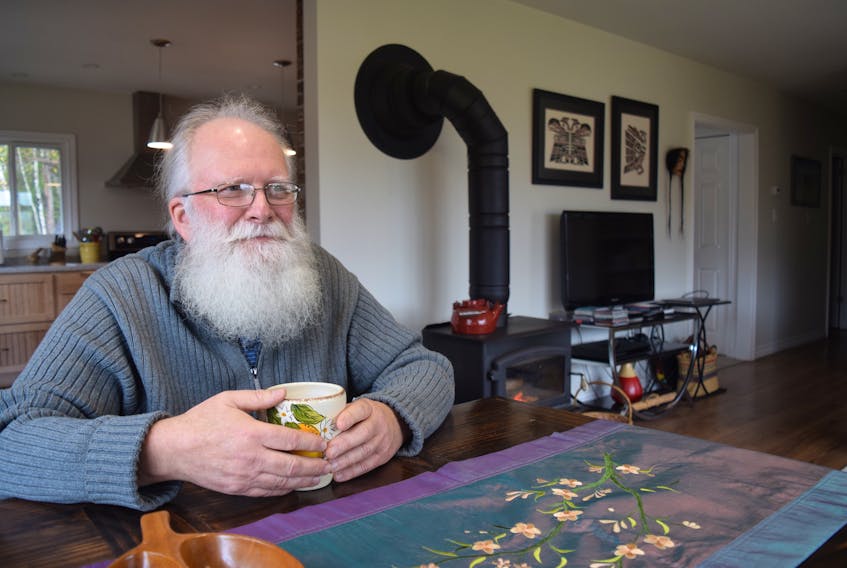CENTRAL NEW ANNAN, N.S. — Paul Jenkinson greets a visitor in his driveway with a warm handshake and a broad smile beneath his Santa Claus beard.
He looks well and is in good spirits, especially it seems, for a man who is 12 days into a hunger strike.
“After three days, you don’t notice it as much,” he says, with a chuckle, about his lack of solid food.
Jenkinson, 65, is a retired social worker but after about a 40-year career of working in child welfare and supporting families, he is not ready to just sit by doing nothing as the earth struggles to deal with a fast-growing climate crisis.
Jenkinson is part of Extinction Rebellion and Hunger Strike for Climate Change “and I will add action,” he says, of the network of like-minded, non-violent protesters for climate change, which is active in more than 55 countries worldwide. He estimates he is one of about 25 people in Nova Scotia currently undertaking such hunger strikes.
“I’m trying to make a political statement or apply some political pressure, trying to connect my hunger with the hunger that will happen for lots and lots of people because of climate change effects,” he says.
Outside, a cool, fall rain pours steadily down. But inside, his neat, comfortable bungalow, where he lives with his wife Lydia, a wood fire burns warmly as Jenkinson sits at his dining table and sips an herbal tea as part of his liquid-only diet. Besides tea, Jenkinson infuses his diet with fruit juice and vegetable broth to which is added some onion and garlic, with all solid bits strained out. “I’m hoping I’m getting some of the goodness and some of the antibiotics,” he says.
“It doesn’t mean you don’t feel hungry ever and that your body doesn’t say: ‘What’s going on here?’” he says. “And you have to be careful, especially your electrolytes. If you don’t manage those you could have organ damage.”

‘This is a political action’
Jenkinson has no desire to harm himself and has set a 30-day goal for his hunger strike. That period is long enough, he feels, to show he is serious about his protest without doing damage to his body.
“So, this is a political action, that’s why it is a hunger strike rather than a fast,” he says. “And it’s my small action along with other Extinction Rebellion Nova Scotia people and the folks around the world to prod the government into action.”
The reason he is engaged in the hunger strike is to draw attention to the connection between climate change and the increasing food insecurity that people are going to experience unless governments act more quickly to reduce the carbon footprint than they currently are, he says.
“So, my brief hunger is nothing like the hunger everybody is going to experience but, particularly people in the global south. They’re the first ones being impacted,” he says.
Jenkinson describes current government actions to deal with the climate crisis as a kind of “bureaucratic snooze, where governments are asleep at the wheel” while consoling themselves that they doing better “than the other guy … .”
But even such actions as Nova Scotia’s recently approved Bill 213 – an Act to Achieve Environmental Goals and Sustainable Prosperity – do not come close to setting the benchmarks that scores of scientists insist are necessary to stop climate change and climate temperature increase, he says.
And while the governments of today may tend to scoff at or downplay incidents of increased flooding, temperature abnormalities, increased wildfires and so forth, Jenkinson predicts that such “conservative” approaches will come back to haunt us once food production begins to suffer and more individuals start to feel the impacts on their personal lives.
“Part of this hunger strike is to say, ‘Hey, there’s going to be very visual costs in the future.’ Like, heightened food costs, failed crops, farmers with anxiety problems because they don’t know what they can expect,” he says. “But overall the adult population has kind of ignored its responsibilities. It’s put it off on government to do it and we’ve enjoyed a lifestyle that kings would never have imagined in the past. It’s unsustainable."
If the common person starts to feel affected and unheard by government, “then civil unrest is likely to happen,” he says. “So, this is a non-violent appeal to other citizens to stand up and to government to start enacting climate change policies that will actually produce food.
“I suppose this is also a call out to all citizens to think about ways that they can individually act.”
Nearly halfway through his month-long endeavour, Jenkinson feels confident he can see it through. If his body starts to tell him otherwise, he will reassess his position.
“I’m feeling reasonably well,” Jenkinson says, shortly before he and his wife see a visitor off from their doorstep with a friendly wave and a smile.









